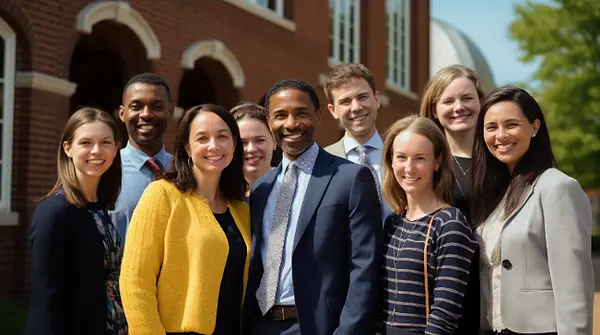
Unlocking Potential: The Essential Guide to Private School Village, Transforming K-12 Education for Black, BIPOC, Hispanic, and Latinx Students
Private School Village is a lighthouse of wisdom, specifically designed to address and overcome educational inequality.
Private School Village provides a private school community for BIPOC families so that students fully thrive. In partnership with more than 65 private schools, Private School Village increases racial socialization, literacy, representation and supports related research. It essentially bolsters diversity and inclusion by bringing families and students together across private schools to create a sense of belonging and more.
Private School Village empowers parent engagement and as a result, instills student well-being, normalizes inclusive and equitable communities, and encourages systemic and institutional policy and process change that will impact a student's healthy development.
It offers an enriching learning environment for Black, Hispanic, Latinx, and BIPOC students, shining a spotlight on the manifold benefits of private schools. This underlines the importance of inclusive curriculums, the essential support required by educators, and numerous pathways to expand opportunities for students.
This article boasts strategic insights into the best BIPOC private school educational consultant in Southern California. It aims to transform K-12 education, making it more inclusive and beneficial for all. By delving into these shared resources, one can comprehend the profound impact of these unique initiatives on molding the future of education for a diverse student body.
Key Takeaways
-
Private School Village employs peer and expert mentorship and specialized programs to elevate education for students of Black, BIPOC, Hispanic, and Latinx backgrounds in grades K-12.
-
Schools embrace inclusivity within curriculum design and teaching practices to foster diverse learning environments.
-
Promote culturally responsive education to overcome educational inequality.
-
Scholarships and financial support mechanisms in private schools open up more opportunities for underrepresented groups.
-
BIPOC educators should seek out support through dedicated mentorship programs, career guidance, and training in culturally responsive teaching.
-
Future initiatives include policy, intimate community enhancement and strategic partnerships to facilitate student success in an increasingly globalized world.
Understanding Educational Inequality
When you are looking for an elite k-12 private school that offers support and cultural advocacy near Southern California it's important to understand the various causes of inequity.
One significant cause is discrepancies in income.
Students from wealthier families often benefit from access to more educational resources, including private tutoring and advanced learning materials. This access can further widen the gap in achievement between students from high and low-income backgrounds. In contrast, children from less wealthy families frequently face challenges such as food insecurity and housing instability, not to mention the allostatic load of being a minority in a predominantly white institution, which can negatively affect their academic performance.
Another major factor contributing to educational inequality is a lack of understanding of the importance of race-based affinity spaces. Many think these spaces increase segregation in schools, however, these spaces create more belonging for those intended to benefit. They may appear to segregate students based on race or income, but those students are the ones who need this type of specialized support in the first place in order to fully thrive. Increasing a sense of belonging in the school community yields happier, better adjusted diverse students who then lend their diverse perspectives and experiences to the larger school community, strengthening the social fabric of our educational institutions. This is a difficult concept for many to grasp and instead, they tend to believe the opposite impact is true.
This underscores the critical importance of tackling educational inequality in our quest to revolutionize K-12 education. We must strive to guarantee equity and inclusivity for every learner, ensuring that no child is left behind in the pursuit of knowledge.
The Role of Private Schools
Private schools play a significant role in transforming K-12 education by impacting the overall academic landscape. They positively contribute to the ongoing discussion around diversity in education, invest in our future workforce in a powerful way, and offer a range of learning environments that cater to unique student needs among other attributes.
These institutions enhance educational opportunities by providing specialized programs and resources often not available in public schools.
Private Schools' Impact
Private schools play an essential role in sculpting today's educational environment. These institutions often pioneer innovative methods, establishing fresh standards in K-12 learning, and they are empowered to act independently and in the pursuit of excellence. Yet, their influence can be seen as a double-edged sword due to school funding disparities and accessibility issues.
Funding disparities often result in inequities, as private institutions generally have more resources at their disposal compared to public counterparts. This disparity could exacerbate the achievement gap in education. Affordability is another major concern. High costs associated with private education might exclude families with lower income, thereby stifling diversity.
Still, private institutions provide unique advantages. Specialized programs, coupled with personalized learning environments and smaller classrooms, contribute to improved student outcomes. In summary, private schools influence education significantly, although this influence is layered and intricate.
Diversity in Education
Private schools, with their inherent flexibility, are uniquely positioned to foster diversity within elementary and secondary education. Their crucial role extends throughout the fabric of the education journey – from diverse vendor selection to enhanced representation within classrooms and adopting inclusive practices. For example, private schools are uniquely positioned to capitalize off of the growing body of research that highlights the fact that racial diversity in a school community yields higher academic outcomes for all students. Yet still, antiquated notions of what diversity in education really means stifle progress.
Ponder the following as most think that:
-
Scholarships offered by private schools can help in bringing in students from underrepresented groups, thereby fostering diversity. In reality, we need to examine how schools are defining diversity to best understand this notion. Most schools offer a range of scholarships to cover teacher tuition remission (for their children), and many non-BIPOC students end up on various forms of general financial aid or scholarship recipients. In both cases, scholarships may or may not be going to underrepresented groups.
-
Crafting policies with inclusivity in mind can encourage respect for all cultures and races. Having policies are an important step, however, many issues rest in the “who” and “how” policies may or may not be implemented or enforced. It is not enough to simply have the policy but consideration needs to be equally give to the intricacies of how the policies will be best managed. 3. Hiring teachers from varied backgrounds enhances diversity in classroom representation. This may not be true entirely as the hiring process in schools and the admissions process in schools are very different and even more, teachers from various backgrounds could equally assimilate to private school norms and standards in such a way as their cultural background or heritage may not be celebrated in school.
Diversity in education has wide-ranging benefits. It not only enriches the learning experience for students but also contributes to a more inclusive, understanding community.
Enhancing Educational Opportunities
In K-12 education, private schooling often propels advancement by offering a broad range of programs coupled with resources and amazing facilities. By the very fact that they are “elite institutions,” they provide personalized student guidance against notable standards, thereby fostering holistic academic growth. Such specialized education s with seasoned educators and mentors helps nurture talents, instills confidence, and imparts crucial life skills.
Encouragement for race-based community affinity groups and interaction is another key aspect, instilling in students a sense of self and societal responsibility. This real-world exposure broadens their horizons, gives them a sense of belonging enabling them to actively contribute to the community. These methods implemented by private schools significantly impact K-12 education, particularly for Black, BIPOC, Hispanic, and Latinx students.
Implementing Inclusive Curriculums
Culturally responsive education and diversity in textbooks are instrumental in fostering an inclusive environment that respects and values the differences among students.
The purpose of this discussion is to shed light on the importance of these aspects in private schools and to provide you with top Black independent school educational assistance in SoCal.
Culturally Responsive Education
Private School Village prioritizes culturally responsive education to meet diverse learning needs effectively. An inclusive curriculum development approach includes:
-
Training in equity: Regular training sessions help teachers gain cultural competency and sensitivity, fostering a fair, respectful environment.
-
Inclusion: Multilingual education, programs, support for students ensures their full participation and helps them thrive..
-
Relevant cultural content: Curriculum elements are drawn from diverse cultures and societies.
-
Engagement with the community: Educational activities involve parents and community members, enhancing cultural diversity.
This comprehensive teaching strategy ensures every student feels recognized, appreciated, and comprehended, creating an inclusive learning space.
Cultivating Cultural Awareness
Cultural, heritage (and religious) understanding is a significant focus at Private School Village, considering the importance of global learning. To instill cultural sensitivity, PSV hopes educational institutions offer a detailed program.
The goal?
Foster an inclusive, respectful environment.
Underlining this approach is education's intersectionality importance, where every unique student's background gets recognized and appreciated.
Here are some of the strategies employed to foster cultural understanding:
-
Diverse cultures and histories feature in the curriculum, giving students a global community understanding.
-
Workshops and seminars provide the necessary knowledge and skills for students to effectively handle cultural differences.
-
Student-led initiatives promoting cultural exchange are encouraged, like heritage presentations, international food fairs, cultural performances, exchange programs.
-
Policies are evaluated and updated regularly to mirror the school's commitment to cultural understanding and inclusivity.
-
Private School Village supports the highest standards for an elite academic education but also, PSV values preparing students for a healthy social and emotional experience too and that requires intentional inclusive initiatives. This is equally important, ideally, for top ranked african american catholic school programs in SoCal.
Supporting BIPOC Educators
Private School Village remains dedicated to bolstering Black, Indigenous, and People of Color (BIPOC) educators within its community-based framework. This dedication manifests through a variety of supportive measures, mentorship programs, and educator training.
Focused partnerships and programs serve as a significant contribution, providing BIPOC educators with the necessary guidance to steer their careers effectively. Matching novice educators with seasoned mentors through the PSV community from the same racial or ethnic background facilitates a sense of belonging and validation. It enables an exchange of experiences, challenges, and strategies for success in the educational domain.
Professional development is another critical area where Private School Village channels its resources. Comprehensive training opportunities are designed to bolster the competencies of BIPOC educators, preparing them to handle the unique challenges they might face. Areas such as culturally responsive teaching practices, racial literacy, and curriculum development form the core of this training.
Advancing Student Opportunities
Private School Village continues to foster educational growth, introducing a range of programs aimed at widening student opportunities for both academic and personal success.
PSV helps parents find elite k-12 private schools that promote cultural and racial socialization, and advocacy near Southern California. They do this by leveraging community strength and fostering inclusive, comprehensive approach to K-12 education that focuses on Black, BIPOC, Hispanic, and Latinx students.
Among their unique efforts in fostering student opportunities include:
-
Scholarship Programs: Aimed at removing financial obstacles to quality education, these programs offer monetary support.
-
Mentorship Initiatives: This program links students with peer mentoring and experts who can offer valuable advice and backing.
-
Academic Enrichment Programs: Complementing standard classroom instruction, these initiatives provide extra learning opportunities to improve student's sense of self, wellbing and mental health.
-
Career and College Counseling: This effort equips students with the necessary information, assisting them in making informed decisions regarding their future education and career trajectories.
Impact and Future Directions
Private School Village's transformative initiatives and programs have brought substantial improvements to students' educational journeys.
This organization's programs have sparked a significant shift in perspective, fostering a more inclusive environment that embraces the rich diversity of Black, BIPOC, Hispanic, and Latinx students.
This shifthas not only broken down barriers but also sown seeds of unity, understanding, and respect. The positive effects of such an enlightened approach are profound, with students experiencing noticeable improvements in academic performance, social skills, and overall well-being.
This isn't just about numbers and statistics; it's about changing lives, empowering students, and shaping a more inclusive future.
This is the power of education at its best - inclusive, transformative, and uplifting.
Private School Village will persist in refining strategies and programs to maintain relevance and effectiveness in the interest of increasing parent engagement. Educating and empowering parents is the best way to Help students reach their full potential and equip them for success in a diverse, globalized world remains the primary aim.
Frequently Asked Questions
What Is an Ed Consultant?
An Education Consultant, often referred to as an Ed Consultant, is indeed an embodiment of professional excellence and a beacon of guidance in the broad spectrum of education. They carry the noble mission of shaping the future of education, be it through the lens of curriculum development, empowering teachers with effective training, or by contributing to transformative educational policies. Their expertise may even extend to the intricate dynamics of school administration. Their role resonates with dedication and commitment, as they contribute significantly to the educational landscape, inspiring change and fostering growth. Their work is not merely a profession, but a passionate pursuit that touches lives and builds futures.
What Is a Consultant in Education?
An Education Consultant is a passionate professional who tirelessly devotes their time and skills to enhance the quality of education across various establishments. They are the unsung heroes who shape the future of education by refining study materials, improving teaching methods, embracing technology in classrooms, and evaluating the success of educational programs. They work hand in hand with a wide array of institutions, including schools, colleges, and even corporations. Acting as catalysts, they drive the growth and progress of education.
Why Do You Need an Educational Consultant?
The need for an Educational Consultant is important in today's complex educational landscape. They serve as invaluable guides, providing clear, unbiased insights into educational matters, helping to chart strategic growth plans, and fostering the development of innovative curriculum designs. More than just advisors, they take on the role of problem solvers, addressing and offering effective solutions to education-related challenges. For parents and students grappling with the heavy decisions about their educational journey, these consultants are there to light the way, helping them make choices that are not only informed, but also aligned with their unique academic ambitions and aspirations.
Why Hire an Independent Educational Consultant?
Hiring an Independent Educational Consultant can offer a range of benefits. They can provide personalized advice based on your specific needs and circumstances, offer a wider range of options and resources, and have the flexibility to work closely with you to achieve your educational goals.
What Is a Synonym for Education Consultant?
Synonyms for Education Consultant include Educational Advisor, Education Counselor, and Learning Consultant.
What Does IECA Do?
The Independent Educational Consultants Association (IECA) is a professional organization that supports and provides resources for independent educational consultants. They offer training, professional development, and networking opportunities to their members.
What does IECA stand for?
IECA stands for the Independent Educational Consultants Association.
What Qualities Do You Need to Be an Educational Consultant?
To be an effective Educational Consultant, you need a range of qualities. These include strong communication skills, a deep understanding of the education sector, critical thinking and problem-solving abilities, a passion for learning and education, and excellent interpersonal skills. It's also important to be adaptable and open-minded, as education trends and methods can change rapidly.
Why would someone need a consultant?
People hire consultants for their expertise and specialized knowledge. Consultants can provide objective advice, assist with strategic planning, identify and solve problems, and implement solutions. They can also bring a fresh perspective and new ideas to an organization.
What is the difference between coaching and consulting in education?
The primary difference between coaching and consulting in education lies in their approach. Coaching focuses on personal development and involves guiding individuals to improve their competencies and skills. Consulting, on the other hand, is more organizational. It involves providing expert advice to improve systems, processes, and overall performance.
Interested in discovering how PSV can help support your private school experience?
Tap here to reach out, connect and learn how PSV can help you.
Private School Village proudly serves the SoCal area from the following location:
Private School Village
4335 Van Nuys Blvd #269, Sherman Oaks, CA 91403
https://maps.app.goo.gl/7Q28N9aNkm5Rjr9q9
Driving directions to Private School Village from San Diego, California




